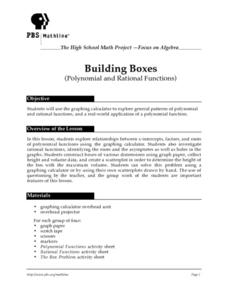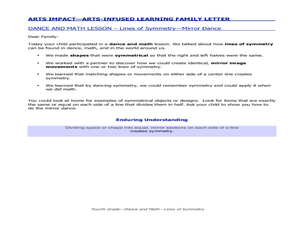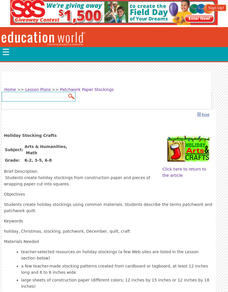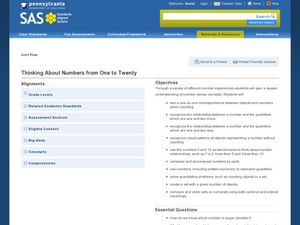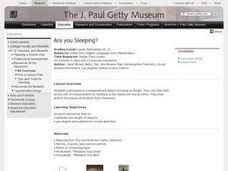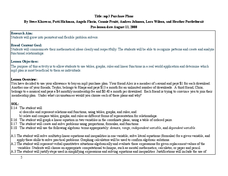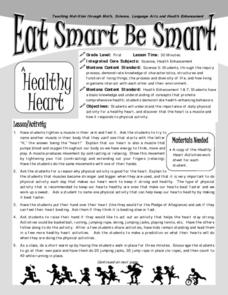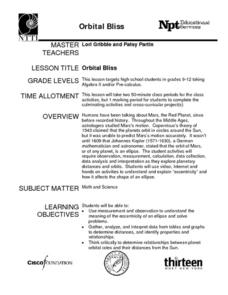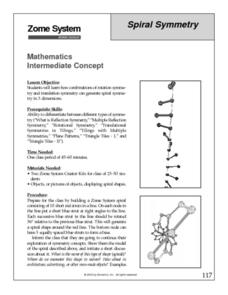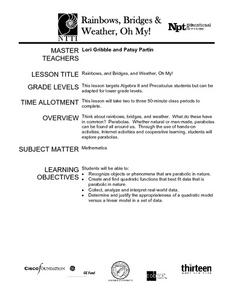Curated OER
Building Boxes- Polynimial And Rational Functions
Pupils investigate the concepts of polynomial and rational functions. They identify the general patterns used to solve problems. The use of real world contexts in the problems helps to promote engagement and understanding of how the math...
Curated OER
Box Plots
Young statisticians are introduced to box plots and quartiles. They use an activity and discussion with supplemental exercises to help them explore how data can be graphically represented.
Curated OER
Lines of Symmetry - Mirror Dance
Fifth graders analyze how to divide space or shape into mirror sections to create lines of symmetry. In this lines of symmetry lesson, 5th graders discuss symmetry in dance, math, and living. Students participate in a dance warm-up and...
Curated OER
Patchwork Paper Stockings
Youngsters create holiday stockings from construction paper and pieces of wrapping paper cut into squares. It's always nice to have a holiday craft, or two, up your sleeve during December. This craft is easy to implement, and the...
Curated OER
Maps and Modes, Finding a Mean Home on the Range
Fifth graders investigate data from maps to solve problems. In this data lesson, 5th graders study maps and collect data from each map. Students present their data in a variety of ways and calculate the mode, mean, median, and range.
Curated OER
Application and Modeling of Standard Deviation
The first activity in this resource has learners computing the mean and standard deviation of two different data sets and drawing conclusions based on their results. The second activity has them using a dice-rolling simulation to...
Curated OER
Fractions
Fourth graders use pattern blocks and fraction identification cards to create and identify fractions. In this fractions lesson plan, 4th graders identify fractions in a pizza, and make fractions with markers.
Pennsylvania Department of Education
Thinking About Numbers from 1 to 20
Help your kindergarteners discover new number-sense concepts and to compose and decompose numbers. Though the resource contains no procedural details, the assessment tool (which you can find in the "printer friendly version") has lots of...
Curated OER
More or Less Pigs in the Pen
Kindergarteners practice basic addition and subtraction. In this math lesson, students sing a song about pigs on a farm to help them understand the concept of adding and subtracting things together. Some excellent extension activities...
Curated OER
Are You Sleeping?
Here is a measurement lesson focusing on length. Learners use their feet as the unit of measurement for furniture in the classroom and at home, and sketch the pieces of furniture they measured.
Curated OER
Adding and Subtracting Algebraic Expressions (Combining Like Terms)
Everyone loves math when it includes food! This lesson tries to take the notion of combining like terms in algebra and comparing it to sorting apples and oranges. It takes a step-by-step approach to helping students understand this...
Curated OER
Searching for Angles and Lines
Young scholars work to find and reinforce concepts related to lines and angles. They identify the characteristics of shapes that have one, two, and three dimensions. The students also work on definitions related to the geometry of shapes.
Utah Education Network (UEN)
The Distributive Property For Numerical and Variable Expressions
Collaborate to research and share. Doesn't that sound great? Learners explore algebraic expressions, use Algeblocks to examine and compare numerical and variable expressions, and apply the distributive property. Examples and worksheets...
Curated OER
MP3 Purchase Plans
Use algebra to solve real world problems. Mathematicians practice use of graphs, tables, and linear functions to solve a problem regarding mp3 purchase plans. They work in groups to solve the problem and present their findings and...
Montana Office of Public Instruction
Eat Smart Be Smart
Get children's blood pumping with this primary grade lesson on the human heart. After learning about the important role this muscle plays in the human body, students monitor their heart rates and discover the importance of staying active.
Curated OER
Orbital Bliss
Most young mathematicians are aware that the planets don’t orbit the sun in a circle but rather as an ellipse, but have never studied this interesting feature. This resource looks at the planetary orbits in more detail and helps learners...
Curated OER
Spiral Symmetry
Taking the notion of symmetry to the next level, this looks at combining rotation and translation symmetry to build spiral symmetry in three dimensions. Using the Zome modeling system and an instructor’s guidance, geometers try to build...
Curated OER
Rainbows, Bridges & Weather, Oh My!
Explore how real-world applications can be parabolic in nature and how to find quadratic functions that best fit data. A number of different examples of modeling parabolas are explored including a student scavenger hunt, the exploration...
Curated OER
What is the Average Height of Your Class?
In this statistics lesson plan, learners use an on-line form generator create a class-specific form, then complete the form, view a graph and data analysis, and draw conclusions.
Curated OER
Where Am I, and How Do I Get Where I am Going?
Students describe geographical places through art, music, writing, and math. They compile information in booklets which may be published.
Curated OER
What Is It?
You have to love lessons that foster problem solving strategies. This one has upper graders devise and employ their own strategy to solve given problems after they have used classics like guess/check, substitution, make a table, and look...
Curated OER
Multiplying by 10
In this multiplying by ten instructional activity, students solve 14 problems in which single digit numbers are multiplied by the number ten.
Curated OER
Catch a Wave
Students study low tides and how to calculate for fresh water. In this ocean science lesson, students pretend they are stranded on an island and must calculate low tide in order to source the fresh water aquifer. Students calculate how...
Pennsylvania Department of Education
Problem Solving by Using Multiplication to Solve Division Problems
Learners use index cards, counting cubes, and their own understanding to identify how division problems can be solved by using multiplication. In this division lesson plan, students use their multiplication skills to solve division...


